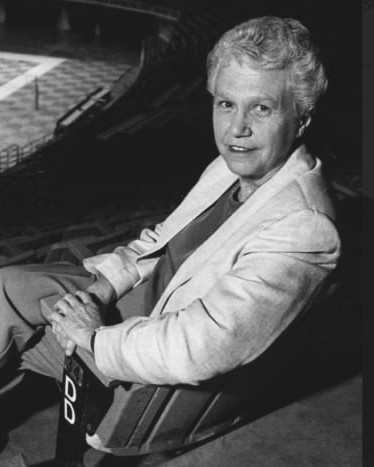Dr. Christine Grant - Champion for Equality
Born: May 27, 1936, Bo'ness, West Lothian, Scotland
Died: December 31, 2021, Iowa City, Iowa, U.S.A.
Dr. Christine Grant was a pioneer for women’s sports and a national leader in the fight for gender equality in athletics.
The University of Iowa has one NCAA Championship and 35 Big Ten Conference Championships in its thirteen women’s sports. Its field hockey team has won 13 Big Ten titles and is the only women’s team from Iowa to win an NCAA Championship. But here’s something important: Iowa women’s teams didn’t begin their championship seasons until 1981, even though men’s teams had been winning since 1900. What caused this long gap? And who helped spark the success of Iowa women’s athletics? The answer is Dr. Christine Grant.
Christine Grant was born in Bo’ness, Scotland, in 1936. Growing up during World War II, she didn’t play sports until age eleven, when she tried netball and field hockey. She quickly fell in love with athletics, especially field hockey, which would shape much of her life.
After earning a degree in Physical Education from Dunfermline College in 1956, Grant taught and coached field hockey in Scotland for five years. Her coaching skills impressed a group of Canadian players, who invited her to Vancouver. There, Grant helped form Canada’s first national field hockey team in 1962 and became its first coach. She also helped create the Canadian Women’s Field Hockey Association.
Grant later moved to Iowa, where she earned another degree in Physical Education at the University of Iowa in 1969 and a master’s degree in 1970. Around this time, she attended her first American football game. She was amazed by the huge crowd and energy, but also frustrated, why didn’t women’s sports get the same recognition? When she asked, the answer was, “Women are not interested in sports.” Grant knew this wasn’t true.
One key moment pushed her further into advocacy. The university revealed plans for a new recreation building, paid for by both male and female students. But the blueprints showed no women’s locker rooms or bathrooms. This clear inequality lit a fire in Grant.
While Grant worked on her Ph.D., the U.S. passed Title IX in 1972. This new law required federally funded schools to treat men and women equally in athletics and academics. The University of Iowa president gave $30,000 to bring women’s club sports up to varsity level. He asked Grant to be the director of women’s athletics while she finished her Ph.D. and coached field hockey. She accepted, and in 1973 women’s varsity sports at Iowa officially began.
By 1974, Grant was leading 11 varsity women’s teams. Resources were tight, teams even had to share uniforms, but Grant’s leadership helped the program grow. Working from her small office in Halsey Hall, she pushed for more scholarships, better funding, and stronger opportunities for women athletes. Between 1974 and 1978, scholarships for women grew from 27 to 80. Budgets rose every year.
Grant’s activism soon reached beyond Iowa. In 1978, she joined a national Title IX Task Force and testified in lawsuits against schools that failed to follow the law. She also gave lectures across the country on gender equality in sports. Meanwhile, Iowa’s women’s teams began winning big. The field hockey team won three straight Big Ten titles from 1981 to 1983, and the cross-country team added another. In 1983, Grant hired C. Vivian Stringer as Iowa’s women’s basketball coach, the first Black woman to coach in the Big Ten. By 1985, the basketball team broke the national record for attendance at a women’s game with over 22,000 fans and later won four straight conference championships.
Grant continued to teach, lead, and serve on NCAA committees throughout her career. She fought for fairness, testified before Congress, and helped shape national policies on women’s athletics. For her work, she was inducted into both the University of Iowa Athletics Hall of Fame and the Iowa Women’s Hall of Fame and received multiple awards for advancing gender equity in sports. Today, Iowa’s field hockey field bears her name.
Dr. Christine Grant retired in 2000 and passed away in 2021. She left behind a legacy of fairness, courage, and opportunity. Because of her, thousands of women athletes at Iowa, and millions more across the nation, have had the chance to play, compete, and succeed.
References:
Dochterman, Scott. “Dr. Christine Grant, Advocate for Women’s College Athletics and Title IX, Dies at 85.” The New York Times, The New York Times, www.nytimes.com/athletic/3548926/2021/12/31/dr-christine-grant-advocate-for-womens-college-athletics-and-title-ix-dies-at-85.
Field Hockey Canada. “2023 Hall of Fame Inductee: Dr. Christine Grant.” Field Hockey Canada, 11 Sept. 2024, fieldhockey.ca/2023-hall-of-fame-inductee-dr-christine-grant.
Person. “2024 Hall of Fame Inductee: Dr. Christine Grant.” USA Field Hockey, Field Hockey, 13 May 2024, www.usafieldhockey.com/news/2024/may/13/2024-hall-of-fame-inductee-dr-christine-grant.
Keywords:
Civil Rights, Justice, Courage, Perseverance, Freedom, Responsibility, Challenge Injustices, Stand Up for Your Beliefs
View Discovery Award projects about this Unsung Hero:
Christine Grant - Discovery Award 2023
- Collections: Art Gallery, Unsung Heroes

